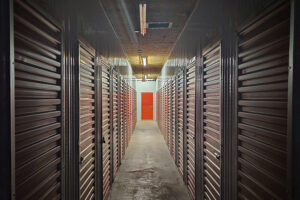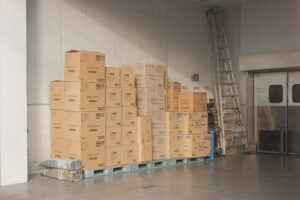What is self storage?

Most people have heard of the term ‘self storage’ but do you know what it means and how it works?
With over 52 million square feet of self storage space in the UK, it’s clear that self storage offers big opportunities and could be exactly the solution you’re looking for.
Let’s take a look at what self storage is and what can be stored within self storage units.
What is self storage?
Self storage is a term generally used to describe a flexible and affordable way to store items. There are different types of self storage ranging from warehouse storage to individual self storage units, and self storage can be used to store all sorts of different things.
Imagine that you don’t have the capacity to store larger items in your home, or you want to create more space by storing belongings that you don’t use on a regular basis. Self storage offers you a clean, safe place to keep things locked away – yet you’ll usually be able to access them as and when you need.
Self storage facilities exist in almost all major cities and in places as diverse as:
The self storage industry has changed hugely in recent years and despite only around 2% of the UK population currently using self storage, those that do quickly become converted.
What is self storage used for?
Self storage can be used for all sorts of reasons and to store a huge variety of items including:
Personal belongings:

eg: kitchenware, boxes, clothing or even record collections
The reasons behind needing to store personal items are often extremely varied but could include anything from people who have decided to take time out to go travelling, to someone who is clearing out their home in need of more space but doesn’t want to throw away items.
Student possessions:
eg: furniture, text books, papers or electrical appliances such as kettles or toasters
Student accommodation can often be problematic when it comes to where to store possessions during holiday periods. If a student is required to clear their rented room or apartment prior to each break, they may need to use a nearby self storage option.
Self storage is often a popular choice for international students too, especially in cities such as Cambridge with such a high percentage of residents connected to the university.
Home furniture
eg: sofas, chairs, tables or even beds
Bigger, bulkier items such as sofas and tables are commonly found in self storage units. Often they are there because people are moving house and may have a gap between ownership, or people have downsized to smaller accommodation but don’t want to sell furniture that doesn’t fit the new space.
Soft furnishings

eg: carpets, rugs, curtains or blinds
It’s common to find self storage units containing soft furnishings that need to be stored in a clean, dry and secure environment. This is particularly common in major cities such as Sheffield and Manchester where homeowners are increasingly tight on space.
Whether the owners are moving home, redecorating or simply not ready to sell items that they no longer need, self storage can be an excellent solution.
Many businesses, especially small and medium sized businesses are also discovering the benefits of using self storage to store items such as:
- Stock
This can be really useful for online retailers who often operate from home offices where they don’t have the capacity to store everything that they’re selling.
A self storage unit close to the home or office of a small business can operate like a warehouse that is secure and accessible 24/7. - Tools and equipment
Depending on the nature of a business, there may be tools and equipment required that simply can’t be stored in the owner’s home.
Similarly, businesses may own equipment that isn’t required all year round – and will want somewhere secure and clean to keep it off season.
What are the different types of self storage?
There are a number of different types of self storage. To find the right option for you, you’ll need to consider some of the following factors:
- The type of items that you want to store: ie: size or specific requirements such as whether they’re fragile or need to be kept at a certain temperature.
- How often you’ll want to access the items
- Approximately how long you plan to store the items for
The main types of self storage can be broken down into indoor, outdoor and mobile. Let’s take a look at each category:
Indoor Storage Units

These are individual units that are secured with their own individual lock or entry system (often accessed via your smartphone).
Many indoor storage units offer users access 24/7 meaning you can easily gain entry as and when you need to, without waiting for set opening hours or needing to book an appointment.
The size of an indoor self storage unit can vary from small lockers to units of up to 500sq ft – meaning that whatever your requirements, you’ll find something to suit your storage needs.
Ground floor self storage units generally have the benefit of drive up access which makes them extra convenient for loading and unloading – especially in poor weather conditions or when using them after dark.
Warehouse Storage
An indoor storage alternative to self storage is warehouse storage. A more traditional option, warehouse storage was used widely by businesses before more efficient self storage offerings became available.
Warehouse storage can be suitable for businesses that require large amounts of space to store bulky machinery and equipment. Most warehouses will have systems in place for maximum safety.
Warehouse storage is generally rented on a long term basis. You’ll need to bear in mind that there will usually be a commercial lease signed by each party involved to formalise the arrangement. Always check this thoroughly and make sure you’re aware of the terms you’re agreeing to.
Outdoor Storage
Storage Containers

Ideally suited to small and medium sized business users, storage containers are made from steel and are often available to rent at self storage facilities. With some self storage companies, you can also rent storage containers and keep them on a plot of land close to your home or business.
Storage containers can offer a huge amount of flexibility to users and come in a variety of sizes – generally ranging from 40sq ft to 160 sq ft. This makes them suitable for storing anything from the contents of a garden shed, to the contents of a 4 bedroom home.
Similar to ground floor indoor units, most outdoor storage containers will offer the benefit of drive up access which makes them extra convenient for loading and unloading.
It’s worth noting that if you’re storing equipment or vehicles in a steel storage container, you may need to remove flammable liquids.
Lock Up Garages
Before more extensive self storage options became available, lock up garages were a popular self storage option.
Generally private rented garages with a locked door, ‘lockups’ were a cost effective option that suited users including students looking to store possessions over university breaks and small businesses needing to store stock or equipment.
Mobile Storage

For many people, transport can be a major issue when it comes to moving their possessions to a storage unit – especially when it comes to larger items. How to get what you need to be stored to the storage unit isn’t always easy – that’s where mobile storage options can help.
Mobile storage options can include:
Pod Storage
A popular option for those without transport is ‘pod’ storage. With this option, you’ll be able to order a mobile storage unit direct to your home or business.
After loading the storage unit, you can then decide whether to store it yourself or pay for it to be taken to separate storage facilities where it will be safe and secure.
Other options:
Some storage companies now offer a ‘box storage’ option. Similar to the format used with ‘pod’ storage, boxes will be delivered to your home or business.
You can fill these with items such as books or papers, then decide whether you want to store them yourself or request that these be picked up and stored securely at a separate site.
The Perks of Self Storage

In the past 5 years, the self storage industry has grown by at least 30%. Considering the COVID-19 pandemic and its severe impact on the industry, this is an impressive statistic and shows that many people are discovering the perks to using self storage in major UK cities such as Manchester, Hull and Cambridge.
So what are the perks of self storage and could it be a good option for you to store belongings that you don’t use, or business equipment that you simply don’t have space for?
Flexibility
Unlike with warehouse storage options that have been popular in past decades, self storage offers a much more flexible approach to storing your belongings safely.
You’ll be able to book online with a contract that renews automatically every 28 days. There’s no notice period either so if you want to vacate the unit, you can. Self storage is ideal for uncertain situations when you’re unsure of exact time scales, or when you simply want to keep things a little open.
Affordability
With self storage, you’ll find lots of different pricing options with many of them being much more affordable than traditional storage means.
You can enjoy a cost effective way to store your possessions on a short term basis whilst you make a long term plan – without having to sign up to a lengthy contract involving time that you may not need.
Self storage also enables you to choose the size of the unit that suits you best – so you won’t be paying for space that you don’t use or need.
Due to the choice of price plans with most self storage units, you can also save money by opting for a longer time frame (if needed) to help reduce the monthly charge that you’ll pay.
Obviously the price of self storage depends on the size of the unit you require and how long you want to use it for, but generally it’s an extremely affordable option that can work well for you or your business.
Security
The majority of self storage units offer 24/7 CCTV meaning your possessions are kept as safe as possible when being stored.
You will generally be given an electronic method of locking your storage unit and will need to enter a security code or use an unlocking device whenever you gain access.
Knowing that your possessions are safe and secure can give you the ultimate peace of mind that self storage is the best option to allow you to focus on other areas of your life and business.
Accessibility
Self storage units are designed to offer access as and when you need it most. You should have access to your belongings at most times throughout the day with most self storage units requiring a security code to gain entry.
The level of accessibility makes self storage a useful way to store business equipment that is too bulky to store at home but is still required on a regular basis. It can also be appealing to homeowners who want to access larger bulkier possessions that they can’t accommodate in their homes.
Within the accessibility perk of self storage units are the following benefits:
- Drive Up Units: this means you can simply drive up to your unit and park next to it as and when required. If you’re loading or unloading boxes in bad weather, you won’t have to worry about walking far or items getting wet or damaged. Similarly, if you’re arriving or leaving in the dark you’ll be close enough to your unit to have everything you need.
- Drop Off Points: for bulkier items, drop off points are ideal for loading and unloading. Why not make things easy for yourself by choosing a self storage facility that offers you the conveniences that you deserve?
The Pros and Cons of different types of self storage
For many people living in busy cities such as London, Manchester or Cambridge they may find that cramped living conditions and smaller than average homes mean that they need to store some of their possessions elsewhere.
The key to using any type of storage successfully is to be as organised as possible. There are some great online resources with helpful tips about how to organise your self storage unit and how to pack and store your possessions in the most efficient way possible:
It’s clear that there are lots of perks to using self storage in general, so what are the pros and cons of different types of self storage?
| Pros | Cons | Best For | |
|---|---|---|---|
| Indoor Self Storage |
|
|
|
| Outdoor Self Storage |
|
|
|
| Mobile Self Storage |
|
|
Depending on the type of mobile storage:
|
How much does self storage cost?

Self storage prices are generally much more affordable than traditional storage options such as warehouse storage. Manchester, Hull and Cambridge all have cost effective self storage facilities offering competitive pricing.
It’s worth being cautious when it comes to self storage pricing and be wary of any offers that seem too good to be true. Obviously you’ll want to get the best possible price but you also want to go with a reputable company who will keep your possessions stored safely.
To work out exactly how much self storage will cost you, there are a number of factors you’ll need to consider including:
Size
Most self storage facilities will have units of different sizes available to you. The size of the self storage unit that you choose can dramatically affect the cost per week of your self storage.
The size of self storage units is measured in square foot and common sized units are 40 sq ft, 80 sq ft and 160 sq ft. These provide spaces available for those needing to store anything from the contents of a garden shed, to the contents of a 4 bedroom house. If you have greater storage needs, you may even want to consider renting more than 1 self storage unit.
The price of bigger storage units is generally higher in busy cities such as Manchester where space is at a premium.
Location
The cost of self storage varies hugely depending on where in the UK it is situated. It’s usually the case that the closer to a city the self storage unit is located, the higher the price per week.
In cities such as London, self storage units can cost much more than in another parts of the country simply due to the higher demand and the limited space available.
Prices in the North of England in cities such as Hull or Manchester are generally slightly lower than those in the South of England such as Cambridge. However, there are usually lots of cost effective solutions on offer if you do your research.
Duration
Most self storage companies offer different pricing structures depending on how long you want to commit to the unit for.
If you’re paying on a weekly basis (with no notice period), you’ll be enjoying maximum flexibility – but you’re likely to be paying a slightly higher price.
For those able to commit to longer periods of time (such as a minimum of 26 weeks) the price per week will decrease. Those able to commit to a term of at least 52 week (1 year) will see the price per week drop once again.
In some instances, there may be introductory offers that you can take advantage of if you simply want to store items temporarily.
Think carefully about how long you can commit to the self storage unit for. In some situations there will be an element of uncertainty (such as storing items between house moves) but if you can commit to a set time period you’re likely to see reductions in the cost of the storage.
Insurance
Almost any reputable self storage company will require you to have insurance when helping you to store your possessions. This is an additional cost that you’ll need to factor into your calculations when figuring out how much self storage will cost for you.
Storage companies will often offer help with providing unit cover or you can use your personal insurance as long as it is in line with storage regulations. The self storage company will need to have proof of your insurance before you begin storing your items with them.
Conclusion
Self storage is gaining increasing popularity in the UK – and it’s no surprise when it offers such flexible and affordable solutions at a time when people need it most.
Offering you the ultimate peace of mind, you can rest assured that your belongings are safe and secure in self storage units – yet you’ll also enjoy 24/7 access to them as and when you want.
Whether you’re looking at using self storage for business or personal needs, we’d love to hear from you to discuss your requirements and how we can help.